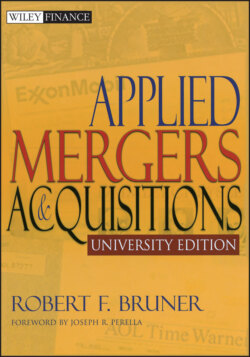Читать книгу Applied Mergers and Acquisitions - Robert F. Bruner - Страница 32
“Right” and “Wrong” Defined by Duty or Intentions
ОглавлениеImmoral actions are ultimately self-defeating. A practice of writing bad checks, for instance, if practiced universally, would result in a world without check writing and probably very little credit. Therefore, you should act on rules that you would require to be applied universally.10 You should treat a person as an end, never as a means. It is vital to ask whether an action would show respect for other persons and whether that action was something a rational person would do—“If everyone behaved this way, what kind of world would we have?”
Critics of this perspective argue that its universal view is too demanding—indeed, impossible for a businessperson to observe. For instance, the profit motive focuses on the manager’s duty to just one company. But N. E. Bowie responds, “Perhaps focusing on issues other than profits … will actually enhance the bottom line…. Perhaps we should view profits as a consequence of good business practices rather than as the goal of business.”11
